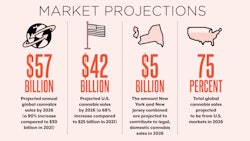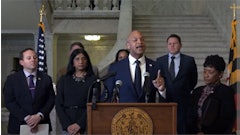
Editor's note: This story was updated at 9 a.m. ET on Thursday, May 4, 2023, to reflect that Gov. Wes Moore signed the legislation into law.
Maryland’s adult-use cannabis market is set to launch July 1 after Gov. Wes Moore signed legislation May 3 to implement a voter-approved legalization measure that passed in the November 2022 election.
“It’s the first step in ensuring an equitable transition to recreational marijuana use in Maryland and repairing the harm that a lifetime of criminalization has had on low income communities and communities of color,” Moore said in a public statement.
The cannabis legislation was among a slew of bills that the Democratic governor signed into law on Wednesday.
On Monday, the Moore administration announced that last week, the governor placed his assets—which included nearly $1.2 million of stock in a cannabis company—into a blind trust in an effort to prevent a conflict of interest, according to the Associated Press.
“The criminalization of marijuana harmed low-income communities and communities of color in a profound way,” Moore told AP. “We want to make sure that the legalization of marijuana lifts those communities now in a profound way.”
Maryland lawmakers finalized the details of the state’s adult-use cannabis program last month; the General Assembly approved legislation April 8 to regulate Maryland’s forthcoming adult-use cannabis industry, sending the bill to Moore's desk.
Lawmakers passed two complementary pieces of legislation last year to set the stage for adult-use cannabis in Maryland; one bill placed a constitutional amendment to legalize cannabis on the state’s November 2022 ballot, and companion legislation authorized adults 21 and older to purchase and possess certain amounts of cannabis for personal use should voters approve the ballot measure.
Maryland voters approved the constitutional amendment last fall, and lawmakers proposed regulations earlier this year to govern the forthcoming adult-use market.
The 100-page bill that passed Saturday would create a new state agency called the Maryland Cannabis Administration to oversee both the medical and adult-use markets, according to The Baltimore Banner.
The legislation also details the number and types of adult-use cannabis business licenses that would be available, as well as levies a 9% sales tax on adult-use sales, the news outlet reported.
The tax revenue generated from the adult-use market would first cover the cost of overseeing the cannabis program, and then the state would be able to distribute the additional funds, according to The Baltimore Banner. The bill requires 35% of those additional funds to flow to a Community Reinvestment and Repair fund that would reinvest in communities disproportionately impacted by the war on drugs.
“We set it up in a very race-neutral fashion as required by the courts,” the bill’s co-sponsor, Del. C.T. Wilson, said last month when his chamber approved the legislation, according to The Baltimore Banner. “But we did so being very mindful of those communities that were not only disenfranchised, but utterly destroyed by drugs and the war on drugs.”
The bill bars local governments from implementing their own taxes on adult-use cannabis, The Baltimore Banner reported, but municipalities will receive a portion of the tax revenue that is collected in their counties, which are required to share a percentage of the funds.
Maryland’s roughly 100 medical cannabis dispensaries will be able to convert their licenses to serve the broader adult-use market, The Baltimore Banner reported. These retailers must maintain an adequate supply of products, as well as either dedicated shopping hours or express checkout lanes, for medical patients.
RELATED: Expanding Your Dispensary From Medical to Adult-Use Sales? Here Are 7 Tips for Success.
The bill also outlines restrictions on where new cannabis retailers can operate, mandating that dispensaries are at least 500 feet from a primary or secondary school, playground, library or public park, according to the news outlet. New retailers must also locate at least 1,000 feet from another dispensary.
The state plans to issue adult-use cannabis business licenses in two licensing rounds, The Baltimore Banner reported. The first round launches Jan. 1, 2024, and is reserved for social equity applicants.
To qualify as a social equity applicant, an individual must have resided for five of the last 10 years or have attended school in communities with a disproportionate number of cannabis-related arrests, based on court data, according to The Baltimore Banner. In addition, those who attended a college where at least 40% of the students qualified for a Pell Grant—a federal financial aid program meant for low-income students—also qualify as social equity applicants, the news outlet reported.
The legislation would establish a social equity office that would operate independently from the Maryland Cannabis Administration and provide small business consulting and free technical support to help boost industry participation from those in communities disproportionately impacted by prohibition, The Baltimore Banner reported.
The state has earmarked $80 million to help support social equity cannabis businesses, according to the news outlet, as well as established loan default provisions to protect banks that invest in entrepreneurs involved in the social equity program.
Additional license types include “standard” licenses that would allow larger businesses to grow, process and sell cannabis, The Baltimore Banner reported, as well as “micro” licenses aimed at reducing the capital required for smaller start-ups. (A micro dispensary license, for example, would allow a licensee to act as a delivery service, selling cannabis without a brick-and-mortar storefront.)
The state plans to issue a limited number of licenses; standard licenses awarded would include 75 cultivators, 100 processors and 300 dispensaries, and micro licenses awarded would include 100 micro growers and processors, according to The Baltimore Banner. Regulators initially plan to award 10 micro dispensary licenses as part of a pilot program, the news outlet reported.
On-site consumption establishments would also be permitted under the legislation, according to The Baltimore Banner, but smoking would be prohibited in these facilities.
The bill’s sponsors reminded their colleagues before Saturday’s vote that the conversation around adult-use cannabis regulations will likely continue in future legislative sessions, the news outlet reported.
“The goal here was never to come up with the perfect product that will never be changed,” the bill’s co-sponsor, Sen. Brian Feldman, told The Baltimore Banner. “I think we’re going to make adjustments to this program on this legal framework every session over the next several years.”
Join us this year at the Paris Las Vegas Hotel & Casino for Cannabis Conference, the leading education and expo event for plant-touching businesses.






















